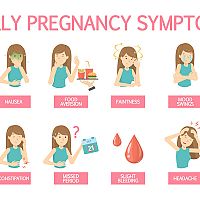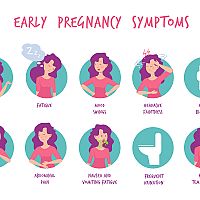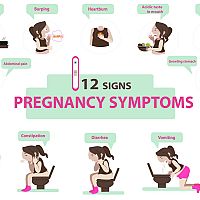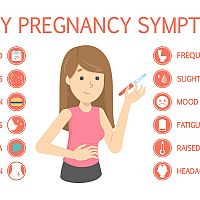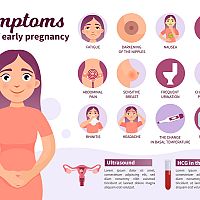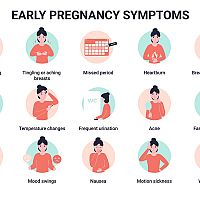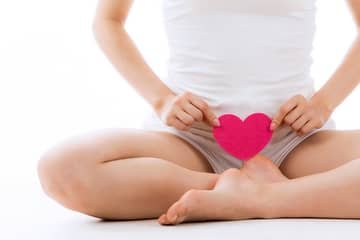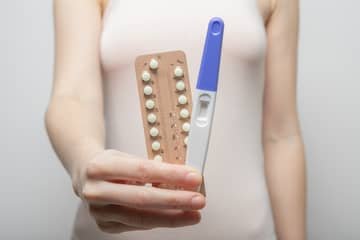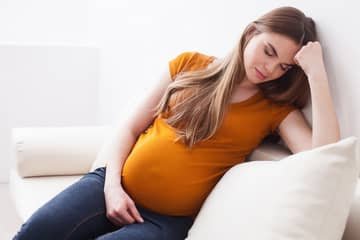
The very first symptoms of pregnancy - discharge, lower back pain, diarrhea, frequent urination, nausea. When will they appear?
How do I know I'm pregnant in the first week? What are the early symptoms of pregnancy? Will a pregnancy test show the correct result just a few days after potential fertilization? These are questions that more than one woman will ask in the course of her life. The days when the female generation drew information on this issue from various physical publications are long gone. It's the Internet's turn to provide the most reliable answers to questions that concern a large part of the world's population.
- The first signs of pregnancy after fertilization
- The individuality of early pregnancy symptoms
- Nausea, vomiting and diarrhea in pregnancy
- Constipation or bloating as primary symptoms of pregnancy
- The beginning of pregnancy also reports sensitivity to smells and changes in taste
- Painful low back, delayed menstruation and pain in the lower abdomen
- White vaginal discharge
- Breast pain during pregnancy
- Frequent urination can be a sign of early pregnancy
- Dizziness and headache in pregnancy
- Fatigue in pregnancy
- Sudden mood swings, hypersensitivity and anxiety
- Unusual pregnancy symptoms
- How do I know I'm pregnant in the first week?
- Experiences
- The most frequent questions - FAQ
- Comments
What are the first symptoms of pregnancy after fertilization, but also what causes them, we have summarized for you in the following paragraphs. However, you will also learn what the difference is between detecting a potential early pregnancy through a pregnancy test and an examination at a gynecologist.
The first signs of pregnancy after fertilization
The commonly known symptoms of pregnancy are essentially a reaction of the female body to the changes that occur in it at that time. The body thus lets the woman know that there has been some kind of change, the cause of which must be found as soon as possible. Sometimes these body signals can be confusing and difficult to distinguish from the primary symptoms before menstruation (hormonal fluctuations, fatigue, pain in the lower abdomen, etc.).
When do primary symptoms appear? The first signs of pregnancy sometimes appear after a week after the fertilization of the egg, but usually after half a month after successful ovulation. This is around the time when, according to the original scenario, menstruation should occur again. Although it doesn't always have to be that way. Even before the first positive test, symptoms may appear, which are exceptional, but still happen. They are mainly related to the excessive production of hormones and the changes by which the organism adapts to the creation of new life.
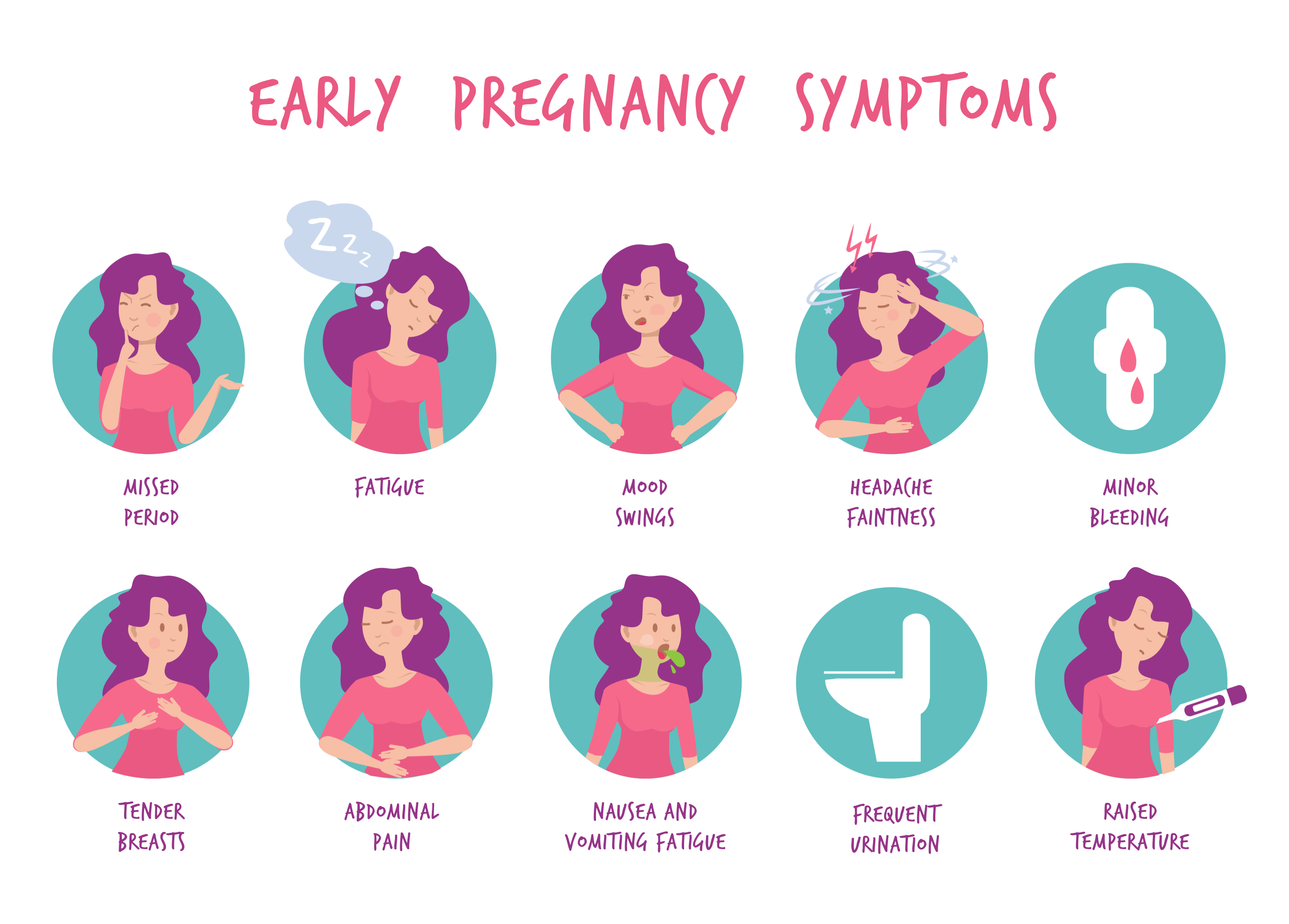
The individuality of early pregnancy symptoms
It is common knowledge that every organism is different, which is no exception even in the case of early pregnancy symptoms. The signs of successful fertilization may be different for each woman. It is even completely natural that the initial symptoms in the same woman are individual for each of her pregnancies. It can happen that with the first child, a woman has dizziness, while with the second pregnancy, vomiting and nausea predominate.
The intensity that individual symptoms take on in different women is also individual, as well as the time during which that primary pregnancy symptom becomes an inseparable part of a woman's life. Among the very first signs of pregnancy is bloating, which can appear immediately after conception, but in many cases it is very difficult to immediately associate it with a possible pregnancy. Within one to two weeks, however, more and more suspicious symptoms appear, such as breast tenderness, abdominal pain and fatigue, while a little later, that is, sometimes in the middle of the first trimester, the traditional, well-known morning sickness also sets in.
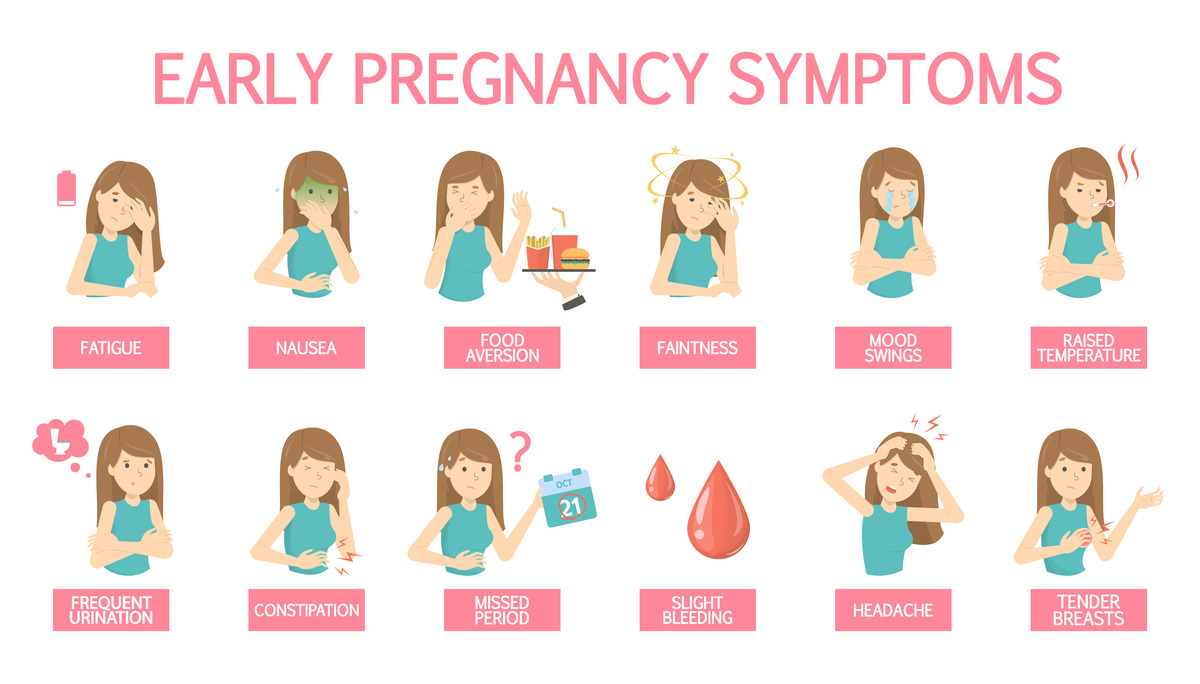
Nausea, vomiting and diarrhea in pregnancy
An unpleasant feeling in the stomach and nausea are among the earliest symptoms of pregnancy, but this may not be the case for every woman, even if it is often highlighted in the media. Nausea is not always 100% proof that a woman is pregnant, and such a manifestation of the digestive system may not be the very first symptom of pregnancy. However, the truth is that 60 to 80% of women suffer from this pregnancy symptom, however sooner or later it occurs.
Some women experience aversion to food and frequent vomiting during the entire first trimester. Others do not notice any change and therefore do not know about pregnancy at all until the first visible changes occur in their body. However, after all, nausea belongs to the beginning of pregnancy, while after the first three months it gives way to other symptoms of a pregnant woman's body. While for most women, nausea and vomiting are a part of pregnancy in the sixth to eighth week, in the case of others, these early symptoms of pregnancy occur already in the first days after conception.
Nausea usually manifests itself in the morning, but in some cases it can occur at the end of the day. The worst thing is if nausea and vomiting burden a woman throughout the day. Such an extreme situation occurs due to various odors and other external factors that literally irritate the digestive system of a pregnant woman.
Of course, pregnancy nausea has its own explanation, which consists in constant changes in the digestive tract, where digestion slows down due to the increased level of progesterone, which naturally slows down the emptying of the stomach. As a result, the woman gets a feeling of fullness, which often leads to the aforementioned nausea. However, the cause can also be found in the production of the hormone hCG - human choriogonadotropin, which is found in a woman's blood and urine exclusively during pregnancy.
In order to reduce nausea, it is necessary to regularly consume smaller amounts of food so that the stomach is always full. If regular intake of wholesome food is impossible due to constant vomiting, it is better to visit a doctor or hospital, where the pregnant woman will be provided with the necessary nutrients through infusion. Persistent, and therefore frequent and unrelenting vomiting can lead to endangerment of the fetus itself, which must be dealt with immediately.

Constipation or bloating as primary symptoms of pregnancy
One of the very early symptoms of pregnancy is bloating. It occurs approximately a few days after conception. Many women attribute this symptom to common digestive problems. Well, only if he often suffers from such problems. During pregnancy, this unpleasant phenomenon causes slowed digestion due to increased progesterone production, but also relaxation of smooth muscles or reduction of peristaltic movements of the intestines.
All the listed causes slow down the emptying of the stomach, which results in a swollen belly in the first weeks of pregnancy, as well as frequent constipation. In order to overcome long-term difficulties of this nature, it takes regular exercise, intake of a lot of liquids and foods with a high fiber content, which helps to even minimally approach the original intestinal peristalsis, which the organism was used to before pregnancy.
The beginning of pregnancy also reports sensitivity to smells and changes in taste
There has been a change in your perception of your favorite food, you eat the smell of which you could not stand before, and you develop a taste for foods that you never even thought of tasting in the past. Changes in taste preferences are among the biggest changes and the most common symptoms of pregnancy, which occur already in the initial stage, when a woman does not even know that a new life is developing in her body. Desires for the most specific foods, even in the middle of the night, are symptoms that are often depicted in movies and series, but they are more likely to appear only in the later stages of pregnancy, when a woman literally eats for (at least) two.
Different smells can also have a negative effect on the above-mentioned nausea, so even an insignificant thing in the form of changing a long-used perfume due to newly discovered preferences is more than likely if you are in the first trimester.

Painful low back, delayed menstruation and pain in the lower abdomen
Symptoms reminiscent of the arrival of normal menstruation, but the woman still does not get "her days"? Hormonal changes after conception and the growth of the uterus itself can cause cramps similar to those experienced by a woman every month during menstruation. If they belong to pregnancy symptoms, they can be more intense than when it comes to menstrual pain in the lower abdomen.
A delay in menstruation is an initial and basic sign that can act as a signal that something is happening in a woman's body, but it does not necessarily mean pregnancy right away. Many times a woman's cycle can be delayed as a result of stress, sudden weight loss, ongoing treatment for a disease or the overall health of the female body. All these causes affect a woman's hormonal situation.
Even in the early stages of pregnancy, slight bleeding or discharge of a darker color may appear, which causes the implantation phase of the fertilized egg in the uterus starting 10 to 14 days after conception. However, the flow of blood is not as strong as during normal menstruation. There are also cases when the usual menstrual cycle occurs even in the advanced phase of pregnancy.
White vaginal discharge
A change can occur in the initial phase of pregnancy not only in the intensity of the produced vaginal discharge, but also in the texture, which is of a thinner nature at the time of initial pregnancy, but the color also changes, taking on a milky white hue. However, if a woman notices an unusual color and unpleasant smell of the discharge, or perhaps feels itching, it is necessary to visit a gynecologist. It could be a vaginal infection that needs to be treated.
Breast pain during pregnancy
The authoritative symptoms include breast pain during pregnancy. In this area of the female body, of course, there are several changes. Already in the initial stage of pregnancy, they acquire fuller and larger shapes, but they also gain in sensitivity. Breast tenderness is a primary sign belonging to premenstrual symptoms, but in the case of pregnancy it is a phenomenon when there is discomfort when carrying or not wearing a bra, while every touch or movement becomes unpleasant.
These very sensitive changes for women result in increased production of estrogen and progesterone one to two weeks after fertilization. It is even common to change the color of the nipples, which acquire a darker shade during pregnancy, which is very noticeable in contrast to the paler skin.
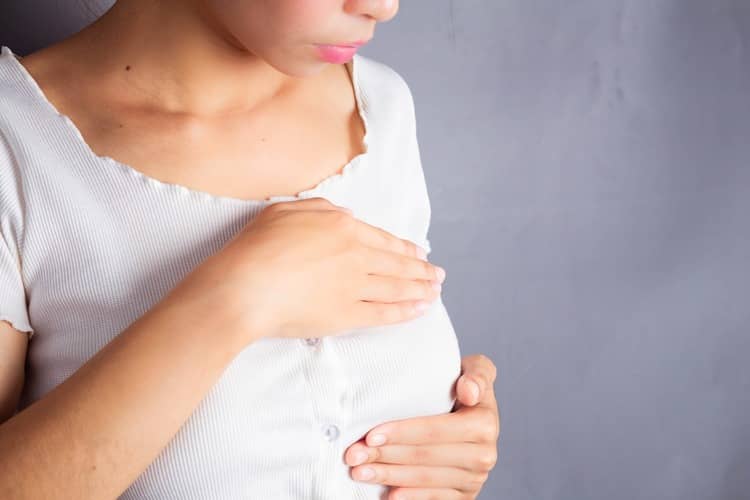
Frequent urination can be a sign of early pregnancy
Frequent urination is also a common symptom of pregnancy. It affects a large number of women, and this phenomenon is caused by increased blood production in the body of a pregnant person, which leads to a reaction from the kidneys. In them, the blood is filtered during detoxification, in the form of the creation of a larger amount of fluids, which must then somehow get out of the body. The justification for this pregnancy symptom lies in the increasingly limited space for urine in the bladder due to the growth of the uterus, already from conception itself. It can therefore be concluded that this is an early sign of pregnancy after the fertilization of the egg.
Dizziness and headache in pregnancy
Hormonal change in the first weeks of pregnancy means a significant burden for the woman's body, with which the organism must somehow cope. The increased production of progesterone in the body of a pregnant woman causes many of the above-mentioned symptoms, but it also causes the expansion of blood vessels and a subsequent drop in blood pressure, which results in headaches and dizziness. The first symptoms of pregnancy in the form of migraines should be consulted with a doctor, while it is important that the woman has enough rest.
A pregnant woman cannot avoid dizziness, but she can prevent its consequences, which include falls and injuries, by immediately sitting down or assuming a lying position, if possible, with the legs raised above the level of the head in order to restore blood flow to the brain. If a woman experiences frequent dizziness during pregnancy, it is better if she carries a bottle of water, some kind of candy with her outside the home, or has a second person with her who can immediately help her in case such a situation occurs.
Fatigue in pregnancy
One of the symptoms of pregnancy in the first days of the new state in which the female body finds itself is frequent fatigue. And that at any time during the day, even at noon. This causes an increase in the level of progesterone and the preparations of the body for the next nine months, due to which the body increases the pace it has been working until now, which exhausts the woman to a large extent, and for understandable reasons.
This symptom at the beginning of pregnancy is not one of the most significant in connection with possible fertilization, as several other factors can be sought behind the feeling of fatigue. However, if it really is a pregnancy, the organism simply signals to the woman that it is necessary to slow down and reserve more time for rest due to the developing new life in her body.

Sudden mood swings, hypersensitivity and anxiety
Hormonal fluctuations are a common part and well-known characteristic of female menstruation, but they are also associated with pregnancy. In some cases, this symptom multiplies several times during pregnancy.
Inexplicable mood swings in a woman as an obvious early sign of pregnancy are even used extensively in cinema as a blatant and unmistakable signal to viewers to notice the change a female actor is going through. Although in movies this symptom is often ridiculed and used as a humorous insert, in reality it should not be underestimated, because it can often lead to extreme cases of anxiety and depression, which, after all, can negatively affect the fetus itself.
Unusual pregnancy symptoms
The absence of any symptoms that a woman would be able to register is one of the strange, unusual symptoms of early pregnancy. Since she does not notice any visible or perceptible changes, she has no reason to question whether she is accidentally pregnant. Such surprising pregnancies can be experienced, for example, by women who for some reason have a long-term problem with irregular menstruation, and therefore do not notice any deviation from normal in their body.
Among the less "radical", but still unusual symptoms, we can include a stuffy nose in women in the first trimester, which is mainly influenced by an increase in hormone levels. As a result, blood production also increases, causing sensitivity of the mucous membranes, which causes congestion, itching or potentially easy initiation of nosebleeds.

How do I know I'm pregnant in the first week?
A pregnancy test is the best friend of a woman who suspects that she is "in it". However, it is always recommended to wait at least two weeks or 15 days from unprotected intercourse. It is most appropriate to wait until the period after the date when the woman's menstruation was originally supposed to start. It is always necessary to follow the instructions written in the instructions for use in order to avoid incorrect use, which could cause a distorted result.
The truth is that even a high-quality pregnancy test may not show the true result in the first days after fertilization. At that time, there is still only a very small amount of the hormone hCG (human choriogonadotropin) in the urine, which may not be detected by the test in the sample. In the early stages of pregnancy, the so-called ghost. This name refers to the faint line on the pregnancy test next to the first, very prominent line. The second line is very faint to invisible a few days after fertilization, so in the case of pregnancy, it will show up in full glory with a greater interval of time, when the level of the pregnancy hormone increases.
It is important to note that the characteristic feature of the mentioned hCG hormone, i.e. the pregnancy hormone, is its initial presence in the blood of a woman, while it enters the urine only later due to the natural functions of the body. It is for this reason that a blood sample taken by a doctor is the fastest and most reliable way to detect an early stage of pregnancy. For the health and proper development of the fetus, it is very important that the pregnancy is caught in time, because only then can the woman start proper prenatal care consisting of a sufficient amount of rest and intake of the necessary substances.
Experiences
Many mothers have experience with the first symptoms of pregnancy after a few days to weeks after conception. Most often, pregnancy was manifested by discharge, abdominal pain, diarrhea, slight spotting, breast or lower back pain. Some women experienced fatigue early in their pregnancy, but many expectant mothers in discussions said they had no symptoms and had no idea they were pregnant until they took the test. It is a very individual matter, sometimes symptoms appear and are different from 90% of women around you, often symptoms do not appear until the first months.
The most frequent questions - FAQ
Are you also interested in other aspects related to the topic of early pregnancy symptoms? Can you think of other questions that were not answered in the text of the article or in the question and answer section ? Feel free to put them in the comments below the article. We will try to answer them as soon as possible.
Is it really necessary to take more pregnancy tests at home?
When should I buy a pregnancy test if I feel that I am pregnant?
When can a woman get a false-positive or false-negative test?
How to avoid constipation during pregnancy?
Gallery
Pridať komentár

